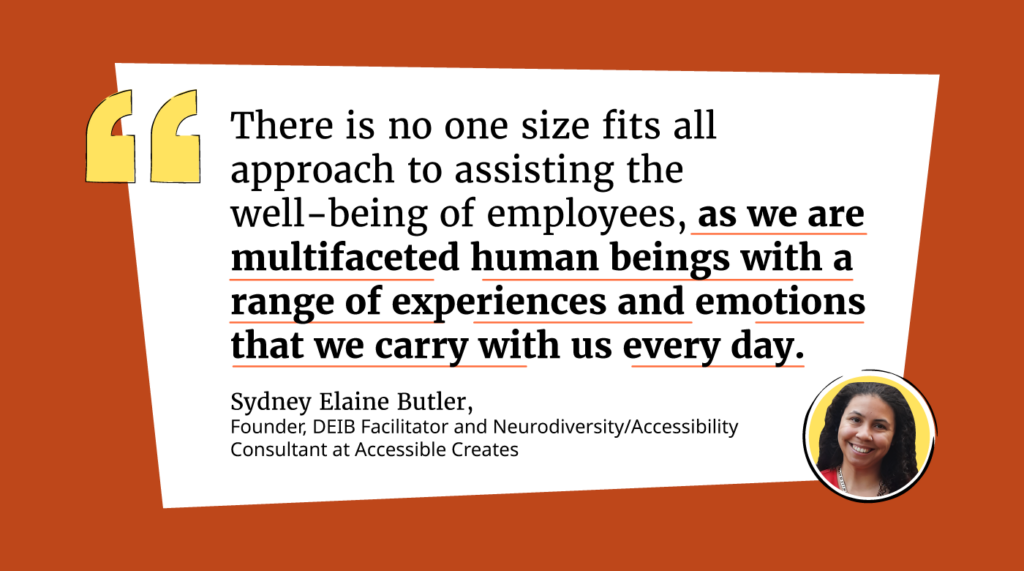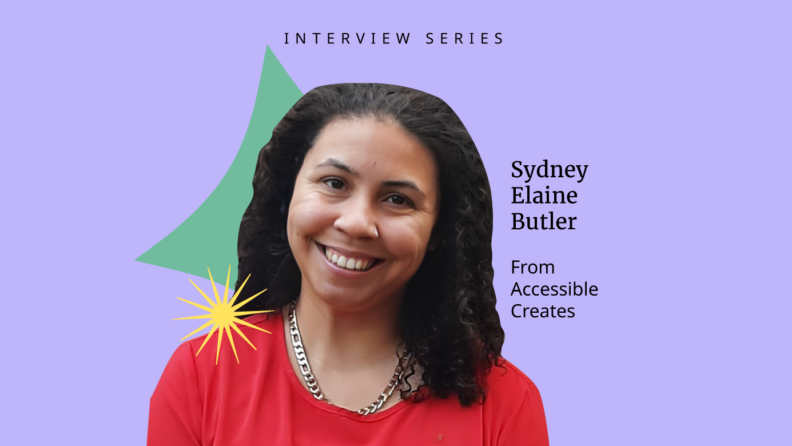We’re passionate about the world of work, and how we can make it better. To help, we’ve launched an interview series where we pick the brains of experienced leaders, business owners, managers, and individual contributors to get their thoughts on how we can collectively build better workplaces.
We’d love to get to know you a bit better, tell us a bit about your backstory.
My backstory? Sounds a lot like an origin story.
I grew up understanding that I had more obstacles than most being a biracial girl who had speech and other challenges, however my parents were always supportive and encouraging where they could be. I attended speech therapy for numerous years while in school and had challenges in school. I had special interests in certain subjects which I excelled in. I thrived in extra curriculars, such as Soccer and Girl Guides. Throughout my time in Girl Guides, I became more confident in learning as well as speaking up for myself and using my voice.
I then went to an Art School for middle school, and fell in love with acting and performing, and learning how to overcome my speech challenges. In High School, I fell in love even more with Theatre and also found love in Business studies. I wanted to be an Environmentalist, but I did not have the grades to do so in Mathematics and Science. So, I applied for a Business-Human Resources program, and fell in love again while also understanding the lack of Accessibility in Business and decided to become an HR Professional who focuses on Accessibility, and other areas of Diversity and Inclusion.
If we were to ask a friend to describe your personality to us, what would they say?
Well, I did ask a friend, I asked my best friend, my life partner Gordon and he said Outgoing, Committed, Energetic, Funny, Engaging, Caring and Loving.

A lot of my friends also say I am resilient. As I have had to overcome lots of barriers to get to become who I am today, and they have seen the growth and the long journey it has been for me, and how I continue to push forward and move forward to improve myself, my life and others around me.
Thinking back to your career journey, what’s an interesting story that stands out?
An interesting story that stands out is that I have always wanted to be a speaker ever since I was a child. I was working in an HR Position while helping the company focus more on Accessibility as well within HR as I was upfront with them about my passion for both and the lack of Accessibility within HR.
I was approached on LinkedIn by an individual who was looking for someone to come speak about Accessibility, and Neurodiversity in the Workplace. I think of the quote “If we wait until we're ready, we'll be waiting for the rest of our lives.” ― Lemony Snicket, The Ersatz Elevator. I felt a bit of imposter syndrome when I did it, but I loved every second of it, and wanted to continue to speak at companies and events, educating attendees on these topics I was so passionate about within Business and Human Resources as I realized I could combine my passions and my dream of being a speaker.
What’s the most impactful lesson you've learned over your career thus far?
The most impactful lesson I have learned over my career thus far is to do work you are passionate about. Yes, I am passionate about HR and being an HR Professional but merging that with my passion for Diversity, Equity, Inclusion and Accessibility, and creating my own path of doing the work I am passionate and proud of allows me to get the most out of my career, and change not only my own life but other’s. I encourage you all to Be true to yourself, and do not be afraid of doing the work you really want to do, life is too short not too.
Thanks for giving us some insight into who you are! Let’s jump into things. When you hear the phrase “build a better world of work”, what comes to mind?
Creating a more inclusive workplace where the wellbeing of ALL employees feels included and valued. As people with disabilities and their wellbeing at work is usually overlooked or seen as an afterthought.
For you, what’s the main blocker you see as standing in the way of building a better world of work?
That people are so stuck in the old ways of doing things and not understanding that it is not okay to feel misery in your place of work.
People think you have to struggle and put well-being aside for the sake of your job.
That they are scared to stand up for what they think is right, and push it aside. Change starts with you and your actions. This needs to change and has started to change in certain industries and countries. Be on the right side of change, or get afraid of being left behind because things are changing fast, and it is okay if you don’t know everything, admitting you don’t is a way to remove those blockers.
What’s one thing within our control that we can practically do to build a better world of work today? And, how do you recommend going about it?
Understanding the well-being of ALL employees. These include diverse employees, and understanding that:

First and foremost, have a conversation with your employee(s) about how they are feeling, and how you can best support them in their work, and understand that daily needs change especially when looking at employees with disabilities or neurodiversity.
What are some tips for having a supportive conversation with diverse employees to ensure they feel safe to honestly share how they're feeling or what they need?
- Ask Questions but also respect when they do not want to answer certain questions
- Listen actively instead of passively
- Come from a place of understanding instead of being defensive
What are the next steps a leader or manager should take after having these conversations with their employee?
- Follow up with them after the conversation
- Continue the conversation as needed
- If they voiced concerns or things they wish to see changed, start the initial stages of implementing and implementing these changes
Can you share one thing you’ve experienced, seen, or read about that is leading us towards a better world of work?
Employee Resource Groups (ERGs) are things I have experienced, seen and also read about that are leading us towards a better world of work. ERGs are Employee Resource Groups which are voluntary, employee-led groups whose purpose is to help foster a diverse, inclusive workplace and are aligned with the organizations that are a part of.
They are usually led and participated in by employees who share similarities and commonalities e.g., gender, ethnicity, religion/spiritual beliefs, lifestyle, or interest, and much more. The purpose is to provide support and help in development both personally and professionally. ERGs facilitate and moderate a safe space where employees can create and bring their whole selves to the group and at work. It is important to understand that while these groups are for people who share similarities that other employees should be allowed to join the ERG as allies to continue to foster that support between coworkers.
By having these groups, it allows for a better workplace as these groups usually have goals of improving the workplace conditions, creating a safer space, fostering leadership skills and leaders, and much more which contributes to the well-being of ALL employees.
I’m curious, thinking about building a better world of work, is there a company and/or leader who stands out to you as someone we should follow? If so, what are they up to?
There is so much amazing work that is being done right now around building a better world of work and more people are dedicated themselves to this work which includes myself. However, other people in this space include; Becca Lory Hector, who also a Neurodiversity subject matter expert such as myself, Diana File who focuses more on DEI Analytics for trainings and organizations as whole, and Avegaile Calzado who is focusing on the well being of immigrants who come to Canada and struggle to find work in their field they have worked in their home country. Lots of work is being done, and these are just some of the people that I would recommend for you to follow.
How can our readers follow your work?
Please feel free to follow and connect with me on my LinkedIn, and my Business LinkedIn for Accessible Creates, as I have other work and articles posted on both of these accounts and will share links and insights there of my work.
Thank you for adding your voice to People Managing People’s interview series on How to Build a Better World of Work!
Add your voice to the conversation
Join our interview series and share your ideas for how we can build a better world of work!


